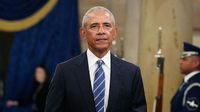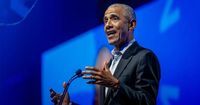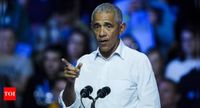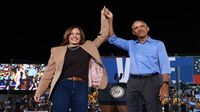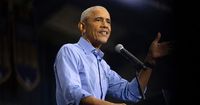Former President Barack Obama and former Vice President Kamala Harris delivered pointed critiques of President Donald Trump and his administration’s actions during separate events on April 3, 2025. Both leaders expressed deep concerns over what they describe as unconstitutional behaviors and a troubling erosion of American values under Trump’s second term.
Speaking at Hamilton College in Clinton, New York, Obama reflected on the current political climate, emphasizing the implications of Trump’s policies, particularly the imposition of new tariffs and the administration’s threats against academic institutions and law firms. “Look, I don’t think what we just witnessed in terms of economic policy and tariffs is going to be good for America, but that’s a specific policy,” Obama stated. However, he expressed a more profound worry about the federal government’s intimidation tactics aimed at universities and legal entities. “I’m more deeply concerned with a federal government that threatens universities if they don’t give up students who are exercising their right to free speech,” he added.
Obama’s remarks underscored a broader critique of Trump’s foreign policy, where he accused the administration of undermining the international order. He specifically called out the administration’s ambition to control Greenland for national security purposes, arguing it reflects a dangerous mindset. “This is an important moment, because in the last two months, we have seen a U.S. government actively try to destroy that order and discredit it,” Obama said.
Kamala Harris, addressing the Leading Women Defined Summit in California, echoed Obama’s sentiments, framing the current administration’s actions as unconstitutional and fostering a pervasive sense of fear among the populace. “What has changed is that there is a sense of fear that has been taking hold in our country, and I understand it,” Harris remarked. She pointed out that many organizations and individuals have remained silent in the face of what she labeled as “clearly unconstitutional threats.”
Harris noted the predictable nature of Trump’s actions since returning to office, stating, “There were many things we knew would happen.” She emphasized the importance of courage in combating this climate of fear, declaring, “Courage is also contagious. When one person, when a few, stand with the courage that is the courage exhibited by the leaders in this room every day, to stand, to have the courage to say, ‘I feel fear,’ the courage to say, ‘what is happening is wrong,’ the courage to say that there is a way that we must chart to get through this.”
In a response to the criticisms, White House spokesman Kush Desai defended the administration’s actions, accusing Harris of having presided over the “weaponization of our justice system against political opponents” during her time in office. Desai’s comments further highlighted the contentious atmosphere surrounding the current political discourse.
Obama also urged universities to resist federal threats that infringe on academic freedom. He advised institutions to engage in self-reflection regarding their treatment of free speech on campuses. “If you are a university, you may have to figure out, are we in fact doing things right?” he questioned. His comments came amid reports of significant federal funding cuts to universities, including a $400 million reduction for Columbia University and a suspension of $175 million in funding for the University of Pennsylvania. Harvard University is also facing scrutiny, with the administration reviewing approximately $9 billion in arrangements with the institution.
More than 800 faculty members at Harvard have signed a letter urging their leadership to take a stronger stance against the administration’s actions. Princeton University’s president, Christopher L. Eisgruber, described the targeting of Columbia as “the greatest threat to American universities since the Red Scare of the 1950s.”
In light of these developments, Obama encouraged law firms facing similar threats to stand firm in their principles, even if it risks losing business. “The idea of canceling a speaker who comes to your campus, trying to shout them down and not letting them speak, even if I find their ideas obnoxious, that’s not what universities should be about,” he stated, advocating for open dialogue and the exchange of ideas as a means to win arguments.
As both Obama and Harris continue to voice their concerns, the political landscape remains charged. The criticisms from these prominent figures reflect a growing unease about the direction of the country under Trump’s leadership. With the 2024 election still fresh in the minds of many voters, the stakes are high as the nation grapples with issues of free speech, academic freedom, and the fundamental values that define American democracy.
In summary, the remarks from Obama and Harris serve as a clarion call for action against what they perceive as a dangerous trajectory for the nation. Their calls for courage and resistance resonate amid a backdrop of fear and uncertainty, urging citizens and institutions alike to uphold the values that have long been cornerstones of American society.
